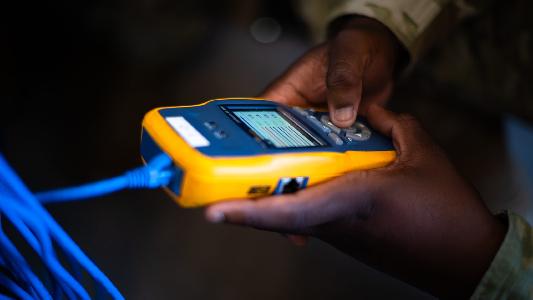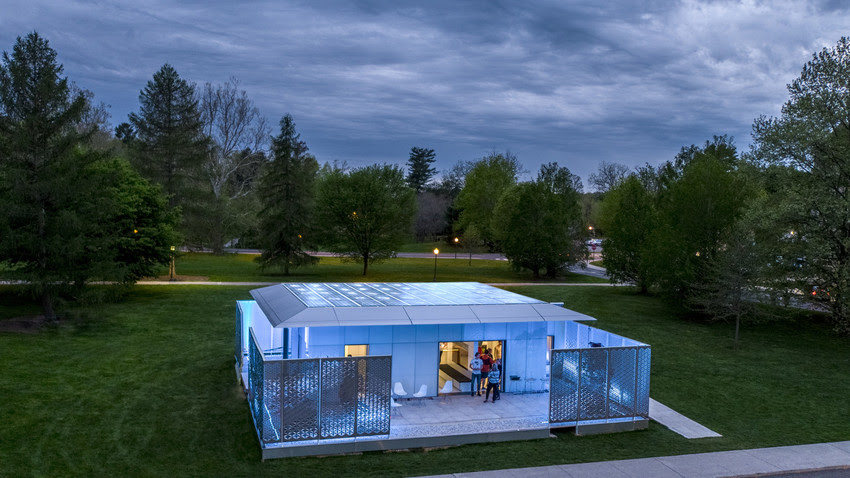Have you ever seen a home completely powered by solar energy? If not, here’s your chance.
Virginia Tech is bringing its FutureHAUS solar home to Alexandria, Va., for the summer. The house will be on display near the location of Virginia Tech’s future Innovation Campus, which is in proximity to the site of Amazon’s second headquarters.
Virginia Tech reported that FutureHAUS was conceptualized, researched and developed by over 100 Virginia Tech faculty members and students. Joseph Wheeler, architecture professor at the university and lead faculty of FutureHAUS, led the charge to create the solar home, along with sponsorship from Richmond, Va.-based power and energy company Dominion Energy.
The solar home is 900 square feet in size, and sits on a 2,800 square-foot plot of land equipped with a patio and garden. Virginia Tech said in a media release that FutureHAUS is completely solar powered, and equipped with 67 smart tech devices including automated sliding doors, a voice command response system and a sink that releases the exact amount of water you need. Bobby Vance, program manager at the Center for Design Research at Virginia Tech, told Technical.ly that the devices were either completely designed by the team or created by combining existing products from multiple companies.
Last year, Virginia Tech won an international competition in Dubai for the solar home, which is aimed at revolutionizing the housing industry. Virginia Tech was the only American entrant at the 2018 Solar Decathlon Middle East, a competition to build sustainable, grid-connected, solar homes, launched by the United Arab Emirates’ Dubai Electricity & Water Authority and the United States Department of Energy. The university beat out 14 finalists and more than 60 applicants. The house was actually built during the competition by 22 students over a two-day period, Northern Virginia Mag reported. Prior to coming to Northern Virginia, FutureHAUS was on display in Times Square in New York City for an annual design week.
“Being able to build extremely efficiently, as well as maintain that sense of humanity and living in the way we design and build, and also celebrating the technology that we have, is a really good balance for something for the future,” Michelle Le, an architectural design leader on FutureHAUS, told Northern Virginia Mag.
Visitors can see FutureHAUS at 2602 Main Line Boulevard from June 22 through August 16. Tours will take place on Thursdays and Saturdays from 11 a.m. to 5 p.m. and Fridays and Sundays from 11 a.m. to 8 p.m. during this time. The FutureHAUS exhibition this summer is presented by Dominion Energy and tours will be guided by faculty and students who were a part of the project. While in Alexandria, the solar home will be closed some days for private events, so check the house’s site for availability before visiting.
“Our current plans are for the house to return to Virginia Tech to be displayed on campus for the fall and spring semesters,” Vance told Technical.ly of the house’s plans once the NoVa display wraps up. “We then have plans to bring the house back to Dubai to be a part of the 2020 Expo.”
Vance told Technical.ly that the FutureHAUS team will continue to develop ideas pertaining to the future of construction and the integration of tech.
“We will continue to prototype these concepts at multiple scales and engage the industry further to make the ideas become a reality,” Vance said.
Can’t make it to FutureHAUS this summer? Check out this video the team put together about the solar home’s creation.
Before you go...
Please consider supporting Technical.ly to keep our independent journalism strong. Unlike most business-focused media outlets, we don’t have a paywall. Instead, we count on your personal and organizational support.
3 ways to support our work:- Contribute to the Journalism Fund. Charitable giving ensures our information remains free and accessible for residents to discover workforce programs and entrepreneurship pathways. This includes philanthropic grants and individual tax-deductible donations from readers like you.
- Use our Preferred Partners. Our directory of vetted providers offers high-quality recommendations for services our readers need, and each referral supports our journalism.
- Use our services. If you need entrepreneurs and tech leaders to buy your services, are seeking technologists to hire or want more professionals to know about your ecosystem, Technical.ly has the biggest and most engaged audience in the mid-Atlantic. We help companies tell their stories and answer big questions to meet and serve our community.
Join our growing Slack community
Join 5,000 tech professionals and entrepreneurs in our community Slack today!

The man charged in the UnitedHealthcare CEO shooting had a ton of tech connections

Northern Virginia defense contractor acquires aerospace startup in $4B deal

From rejection to innovation: How I built a tool to beat AI hiring algorithms at their own game



